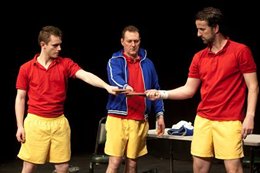Table tennis, ping-pong... call it what you will, one thing is certain: it would appear, on the surface, to be the most unpromising subject matter for a play. But Simon Block’s Not a Game for Boys, which was premiered at London’s Royal Court Theatre in 1995, has since been performed all over the world, which implies that there is more to it than earnest debates about volleys and serves and drop shots. In fact, it’s a smart piece of writing, whose content, language, humour and attitudes are very much of its time, slotting it effortlessly into the genre of laddish, ‘in-yer-face’ theatre much loved by 1990s audiences.
Belfast-based C21 Theatre Company has a similarly male image, co-founded in 2004 by veteran actor/director Peter Quigley and three underemployed young actors, one of whom (Stephen Kelly) is in the cast of this lively touring production. Never afraid to go out on a limb, Quigley has relocated Block’s original London-based text to a Northern Ireland setting. One could cite many previous examples where this decision has failed spectacularly, but in this case the transposition is effortless, allowing the cast to use their own accents on local references and place names, which ratchet up the possibilities for humour - much of it of the salty, ribald variety. In a rather different vein, the sight of a gun being produced from a bag carries much more than the suggestion of mere self-defence when the location for the drama is 1990s Belfast, and it is an image whose spectre hovers menacingly over the subsequent exchanges.
Eric, Oscar and Tony are three taxi drivers, whose respective lives are going nowhere. In their different ways, Eric (Kelly) and Oscar (James Doran) are experiencing a mid-life crisis, while Jack-the-Lad Tony (John Travers) just lives for the day and the next available woman. Eric feels trapped by family life, besieged by a nagging wife, ungrateful kids and a senile, incontinent mother. Oscar is a deadpan, dry-witted bachelor, who senses the onset of mortality after attending the funeral of a team-mate earlier that day.
 We join them as Eric and Oscar get changed into their red and yellow kit, talking match tactics and checking their watches anxiously for the non-arrival of young Tony. He eventually staggers in, exhausted from a sweaty assignation in the back of his cab and paranoid that his partner may find out what he’s been up to.
We join them as Eric and Oscar get changed into their red and yellow kit, talking match tactics and checking their watches anxiously for the non-arrival of young Tony. He eventually staggers in, exhausted from a sweaty assignation in the back of his cab and paranoid that his partner may find out what he’s been up to.
We meet these unlikely mates in the shabby changing room of a community hall, where a relegation match in the local league is taking place. For Eric, in particular, this weekly 45 minutes of nail-biting sporting competition is the high spot of his existence. The way he sees it, death would be preferable to relegation. Table-tennis is, beyond argument, the one thing that keeps him alive and relatively sane. Each goes off in turn to play his match, leaving the other two to share confidences and complain about the missing other. And while, off-stage, tension rises across the table, so the emotional undercurrents washing around and between the three begin to surface.
Quigley skilfully directs the cast into achieving an unflagging ping-pong dialogue, which plays effectively into the fluency of the writing and the increasingly expletive-strewn black comedy. The minimal set contains only a shabby table, a few bats and some water bottles, but each man arrives, sports bag in hand, hinting at the baggage they are carrying in the outside world.
Kelly is entirely believable as the highly strung, angst-ridden Eric, harbouring a whole host of guilty secrets. Travers gets the laughs while trying just a little too hard as cocky, devil-may-care Tony, who slowly comes to understand the value of the good woman he has waiting at home. And Doran, who could make reading the telephone directory sound interesting, has all the world-weary air of a man teetering on the edge. Together they make a fine job of this funny, heart-breaking portrayal of friendship, loyalty and values.
Jane Coyle is a Belfast-based arts journalist, critic and screenwriter, who also reviews for The Irish Times and The Stage.